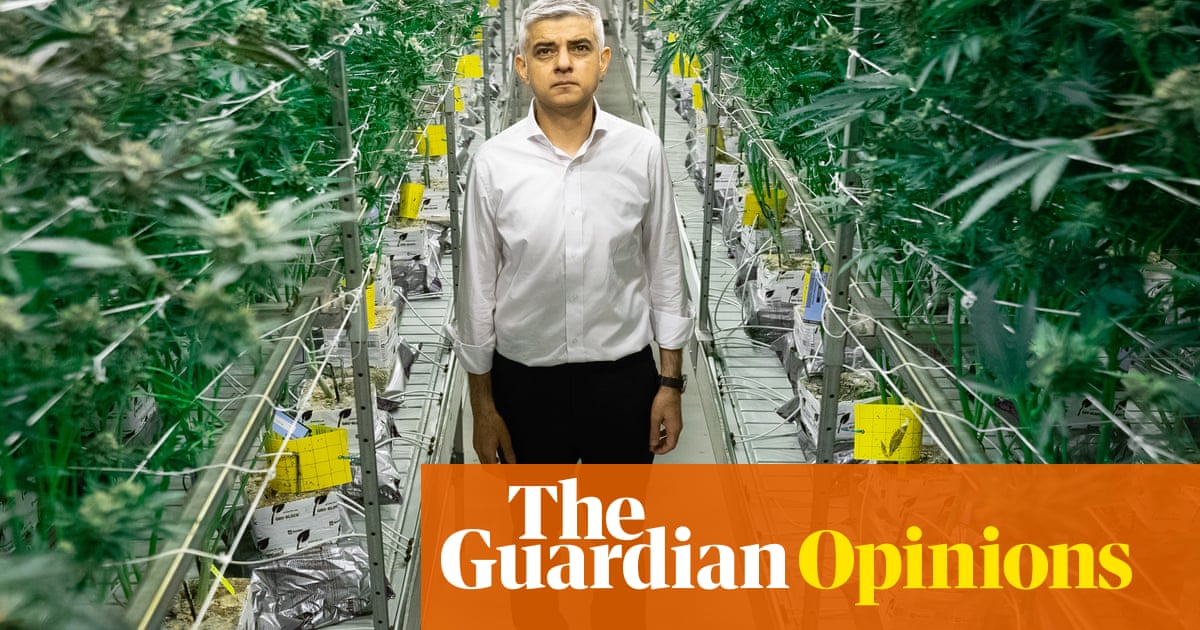Yet another attempt to inject sanity into Britain’s archaic drug laws has failed. The mayor of London, Sadiq Khan, last month accepted Lord Falconer’s modest proposal todecriminalise the possessionof small amounts of cannabis. He was stamped on yet again by that citadel of reaction, the Home Office, and its boss, Yvette Cooper. Falconer’s distinguished group of lawyers, doctors and academics did not suggestlegalisation. They simply argued that treating people using cannabis as criminals served no purpose. It confused soft drugs with hard, was racially biased in its enforcement, diverted police time from more pressing matters and denied help to those who needed it.
An old game of media interviews is to ask politicians if they have evertaken drugs. Prime ministers from David Cameron and Boris Johnson to Keir Starmer, as well as the deputy prime minister, Angela Rayner, have either admitted to taking them or refused to deny it. Politicians feel that what the middle classes do at university is harmless fun. If it happens on a council estate, however, it is a route to prison.
The reality is that the divide in Britain is not between those “in favour” of cannabis and those against. It is between those who care about the impact of criminalisation and those who don’t, a subset of whom merely want to sound macho. Decriminalisation in one form or another has been proposed for a quarter of a century. In 2000 the Police Foundation committee on drugs, of which I was a member, adviseddowngrading cannabisfrom a class B to a class C drug and in effect decriminalising it – but politicians never followed through. This was despite apoll by the Mirrorin 1997 showing that almost two-thirds of the public were then in favour of decriminalisation.
In 2004 cannabis wasreduced to class Cbut not decriminalised. Then, in 2009, Gordon Brown played tough and returned it to class B. The then home secretary sacked the government’s drug supremo, Prof David Nutt, for evenbreathing the word reform. By 2010 there were43,000 convictionsa year for drug possession,more than halfof them for cannabis. An internal government report recommended decriminalisation in 2016but was suppressed. The government even denied afreedom of information request, as if national security were at stake.
The more studies and inquiries recommended reform, the more Whitehall dug in. Courts and jails became increasingly clogged and have remained so ever since. The hottest market for cannabis in Britainis now his majesty’s jails.
The UK is adrift in the western world in still wasting billions on its “war on drugs”. Half of US states have legalised and licensed cannabis, including cities such as New York, Los Angeles and San Francisco. In California there arecannabis cafes, cannabis farming estates and evencannabis sommeliers.
Of course there have been problems, not least withhard drugs in libertarian Oregon. New York’s licensing system has not worked, withillegal outlets outnumbering legal ones. But no one wants to go back. As it is, more Americans todaysmoke cannabis than tobacco, including an astonishing five times more among those aged 18 to 34. There has been no noticeable collapse in American people’s health. Even Donald Trump favourslegalising cannabisfor personal use in his home state of Florida.
Other countries, such as Canada and Uruguay, have legalised cannabis. Many more have decriminalised possession, including Portugal, the Netherlands, Italy, Switzerland, Spain and, as of last year, Germany, where individuals cangrow and use small quantities.
Plenty of British police forces have also gone down the Falconer route to some degree. There has beende facto decriminalisation in Durhamand a number of other forces, as well as a successful but not repeated Metropolitan police trial in Lambeth, south London, in 2001.
Other countries have researched, experimented and innovated. They have found ways to handle cannabis without disaster. Many places, such as Colorado, have taxed it and seen a boost in local revenue. Strong cannabis, or skunk, is bad for you but large numbers of Americans are clearly finding cannabis preferable to tobacco. It is not going away, any more than alcohol or cheeseburgers.
British home secretaries behave like the politics addicts they are. They close their eyes and ears and scream. The real issue in Britain is not drugs. It is the systematic ruining by the state at vast expense of tens of thousands of young lives each year. The damage is done not by cannabis, but by criminalisation, which draws young people into gangs that deal it and from there towards hard drugs and imprisonment.
The result is that society suffers a monster misdirection of police resources. Violent crime in Londonhas increasedalmost every year for the past decade. There has been a rise insexual assault, car and phone thefts and petty fraud. Shoplifting in London rose by an extraordinary54% last year. Imagine how much time the police would have were they not spending so much of it stopping, searching, and testing people for drugs.
Volunteers struggling to combat drug use – defying the government by testing drugs at music festivals, combating Glasgow’s drug problem and keeping children out of county lines – have known one thing for the past quarter century. Whatever needs to be done about drugs, the criminal law as enforced in Britain is a useless answer. Police forces and charities have tried to advance decriminalisation against rigid opposition from Whitehall. As for elected mayors and local discretion, forget it. Westminster’s contempt for local democracy is unrivalled. The truth is that what is lacking is not more reports or more brains, it is more guts. On drugs, Britain is still in the dark ages.
Simon Jenkins is a Guardian columnist
